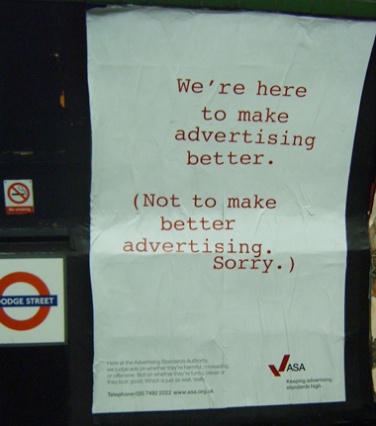As marketers, we harbor a distinct relationship with the science of human behavior, which is to say we aim to control it.
If that sounds overstated, or simply too dramatic, it’s because notions of mind-control, thought guidance, brainwashing— however you want to characterize it— are sinister. There’s nothing so blatantly evil in advertising.
However, every time we write new ad copy, every time we develop a new strategy, every time we rationalize targeting a new audience, we operate under a set of ethics. Whether these ethics are established as a consequence of individuality, a charter written by the agency that employs you, the BBB’s Code of Business Practices, or by principles and practices extolled by those marketing moguls enshrined in the Advertising Hall of Achievement.

We want something from the end user. That user is capable of performing some desired action, defined by the goals of the advertiser. We operate within our own means— the use of search engine ads for most readers of this blog— to maximize the likelihood of the user taking that action (a click, and subsequently a conversion).
In doing this, we interrupt the natural progression of another human being’s behavior. Advertisers are an outside force, having paid for the privilege of a presence in someone else’s life. Again, dramatic? Perhaps. True? Absolutely. And it’s a truth easily ascertained by a person giving thought to their surroundings. Advertisements are in many ways an intrusion, and if they aren’t necessarily unwelcome, very rarely are they desired.
Idealism vs Reality
There is a paradox inherent in the values commonly upheld as standards for ethical advertising versus the realities of the advertising industry.
Those values are as follows:
- Respect the integrity of truth, and do not deceive.
- Respect the dignity of each person. Do not exploit human weakness, such as lust, vanity, envy, and greed.
- Respect social responsibilities. Do not promote consumption as a way of life. Act in a manner designed to benefit the ecology.
Before addressing these individually, let’s admit to a brutal reality of our industry: most people do not trust advertisements to tell the truth.

So from where did this skepticism come? Well, from instances of unethical advertising gone public. In 1991, Volvo rigged one of their cars to withstand being crushed by a monster truck, even though this structurally reinforced vehicle was not an accurate representation of the product.
And how about infomercials, adverts for psychic hotlines, or Cash-4-Gold style businesses capitalizing on consumer fear of economic turmoil? These venues are all unapologetically disreputable (and are key perpetrators of instilling in humans a sense of need for the useless), but they’re still able to operate within the confines of advertising regulations.
In an age where information travels faster and further than ever, is it any wonder that audiences have been conditioned to be wary of advertisements? All it takes is one bad experience— an overpromise discovered, failure to deliver on the ad messaging, a shoddy product— put in a tweet or a blog post, and suddenly the world knows.
Any marketer worth her salt has got some creative bones comprising her professional skeleton. The industry offers a lot of creative outlets, though for digital marketers such as ourselves, probably the most conventionally creative venue we have is the ads themselves.
However, that venue is extremely limited. It’s tough to say what you want to say in 95 total characters of non-URL text.
1.
What is the difference between unethical and ethical advertising? Unethical advertising uses falsehoods to deceive the public; ethical advertising uses truth to deceive the public.
Vilhjalmur Stefansson
Let’s return to that first golden rule of ethical advertising? Tell the truth. I don’t challenge it. Certainly the audience shouldn’t be deceived. But it should be acknowledged that the idea of truth is seldom so black and white.
What if the truth is longer than 95 characters? Then what?
Well, conventionally you then tell as much of the truth as you can. But how truthful is a partial truth? Especially when you pick and choose which parts of the truth to include, and which to omit.
But then, isn’t that the same function as a trailer for the summer’s next blockbuster, or the blurb on the back of a paperback? Is it dishonesty if the truth is truncated by the restrictions of your platform?
Advertising is about generating interest. A partial truth can be a deception. That’s absolutely true. However, advertisements are ubiquitous enough today that people have an inherent understanding of their function. The full truth is not the expectation, just as moviegoer doesn’t expect a full plot from a preview, and a shelf-browser at Barnes & Noble doesn’t read the back cover of the latest John Grisham novel expecting the twist to be revealed.
You don’t give away the milk before selling the cow.
So, when a searcher clicks an ad that says “40% off on black shoes”, and then the landing page further reveals that this deal applies only to black velvet shoes, that’s not a deception so much as it is staggering the delivery of the truth.
2.
Advertising is the rattling of a stick inside a swill bucket.
George Orwell
Let’s move to the second pristine value of advertising: respecting human dignity and not appealing to senses of greed, lust, or vanity.
One could build a strong argument that in a capitalist economy, to ignore human weakness is to holster your most efficient weapon. And therein lay the rub— somewhere along the way, the human affinity for material objects, the lavish lifestyle that has become synonymous with success, have been characterized as weakness.
Seems like a bit of an antiquated sentiment, right? There’s nothing wrong with reward. Reward needn’t be some notion of personal betterment or growth. Perhaps the perceived link between materialism and happiness is an ugly thing. Probably it varies from person to person. But to qualify happiness based on its origin seems a presumptuous undertaking— to say nothing of altering your approach to advertising based on it.
Furthermore, targeting in advertising has risen dramatically in its capacity for specificity. To promote a product or service to a person whose behavior has in some way indicated their likely interest is not disrespectful, and certainly does not compromise their dignity.
However, some of the methods available to advertisers, and specifically digital advertisers, do have the ability to undermine human dignity. Remarketing, namely. Just because someone gets cookied on a bankruptcy lawyer’s webpage, should that person be subjected to having an advertisement follow them around the web that proclaims their financial distress, a constant reminder, and visible to any friends or family that may use the computer?
3.
And now addressing the third ethical benchmark of advertising: respect social responsibility, i.e do not promote consumption as a way of life.
Our enormously productive economy demands that we make consumption our way of life, that we convert the buying and use of goods into rituals, that we seek our spiritual satisfactions, our ego satisfactions, in consumption. The measure of social status, of social acceptance, of prestige, is now to be found in our consumptive patterns. The very meaning and significance of our lives today expressed in consumptive terms.
Victor Lebow
The dissonance here is immediately evident. Consumption already is a way of life. The health of our economy essentially depends on it. Whether that occurred as a result of advertisers effectively creating the illusion of need for their product, or rather as the notion grows that things are what evince success, that particular ship has sailed, and it’s probably not curating ad messaging that’s going to summon it back to shore.
Individuality is established through consumption. What people wear, what media they intake, what they eat, their hobbies, all comprise individuality, and each of these components houses its own set of products and services and competition.
The notion that it is somehow irresponsible to contribute to this reality is perhaps the most blatant offender of ethical idealism.
Shift in Philosophy
First we thought the PC was a calculator. Then we found out how to turn numbers into letters with ASCII — and we thought it was a typewriter. Then we discovered graphics, and we thought it was a television. With the World Wide Web, we’ve realized it’s a brochure.
Douglas Adams
The world changes, and we do well changing with it.
The availability of information is immeasurably vaster now than it was, say, twenty years ago. That’s the Internet for you. Metadata, search history, interests, purchases all conspire to create a digital snapshot of you as a consumer. Heck, even your private emails and chats are scanned for keywords.
To many, this reality is an egregious invasion of privacy. And one whistleblower’s revelations changed the landscape of how Americans perceive their own digital presence. But to many more— namely those who have spent the greater portions of their lives with the Internet— there’s an element of convenience at play.
We’ve grown up surrounded by advertisements. They’re everywhere. Television, print, stores, highways, video games, on clothing, on coffee mugs, in the news, in music, disguised as customers at your favorite bar.
And now, suddenly, these advertisements are much more relevant. For the generation (soon to be generations) that grew up in the age of information, that’s actually pretty nice. The ads were going to be there anyway, right? Tough to be upset when they show me a new pair of shoes that I actually like!
The issue with the ethical declarations challenged above are that they make blanket assumptions about all humans:
1) that they are easily deceived
2) that their dignity is fragile, and
3) they value privacy over relevant advertising.
Human perception of what is okay and what’s not is dynamic, and the biggest catalyst for change is change itself. The arrival of the Internet changed the world. The advertising landscape was, and is, a large part of that.
So why should the definition of what comprises an ethical advertisement remain the same?
(featured image by Wrote/Flickr)



